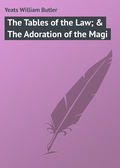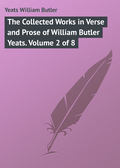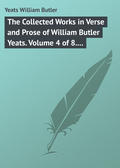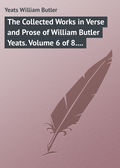
William Butler Yeats
The Cutting of an Agate
XIII
Once when I had been saying that though it seemed to me that a conventional descriptive passage encumbered the action at the moment of crisis, I liked The Shadow of the Glen better than Riders to the Sea, that is, for all the nobility of its end, its mood of Greek tragedy, too passive in suffering, and had quoted from Matthew Arnold’s introduction to Empedocles on Etna, Synge answered, ‘It is a curious thing that The Riders to the Sea succeeds with an English but not with an Irish audience, and The Shadow of the Glen, which is not liked by an English audience, is always liked in Ireland, though it is disliked there in theory.’ Since then The Riders to the Sea has grown into great popularity in Dublin, partly because with the tactical instinct of an Irish mob, the demonstrators against The Playboy both in the press and in the theatre, where it began the evening, selected it for applause. It is now what Shelley’s Cloud was for many years a comfort to those who do not like to deny altogether the genius they cannot understand. Yet I am certain that, in the long run, his grotesque plays with their lyric beauty, their violent laughter, The Playboy of the Western World most of all, will be loved for holding so much of the mind of Ireland. Synge has written of The Playboy, ‘anyone who has lived in real intimacy with the Irish peasantry will know that the wildest sayings in this play are tame indeed compared with the fancies one may hear at any little hillside cottage of Geesala, or Carraroe, or Dingle Bay.’ It is the strangest, the most beautiful expression in drama of that Irish fantasy, which overflowing through all Irish Literature that has come out of Ireland itself (compare the fantastic Irish account of the Battle of Clontarf with the sober Norse account) is the unbroken character of Irish genius. In modern days this genius has delighted in mischievous extravagance, like that of the Gaelic poet’s curse upon his children, ‘There are three things that I hate, the devil that is waiting for my soul, the worms that are waiting for my body, my children, who are waiting for my wealth and care neither for my body nor my soul: Oh, Christ hang all in the same noose!’ I think those words were spoken with a delight in their vehemence that took out of anger half the bitterness with all the gloom. An old man on the Aran Islands told me the very tale on which The Playboy is founded, beginning with the words, ‘If any gentleman has done a crime we’ll hide him. There was a gentleman that killed his father, and I had him in my own house six months till he got away to America.’ Despite the solemnity of his slow speech his eyes shone as the eyes must have shone in that Trinity College branch of the Gaelic League which began every meeting with prayers for the death of an old Fellow of College who disliked their movement, or as they certainly do when patriots are telling how short a time the prayers took to the killing of him. I have seen a crowd, when certain Dublin papers had wrought themselves into an imaginary loyalty, so possessed by what seemed the very genius of satiric fantasy, that one all but looked to find some feathered heel among the cobble stones. Part of the delight of crowd or individual is always that somebody will be angry, somebody take the sport for gloomy earnest. We are mocking at his solemnity, let us therefore so hide our malice that he may be more solemn still, and the laugh run higher yet. Why should we speak his language and so wake him from a dream of all those emotions which men feel because they should, and not because they must? Our minds, being sufficient to themselves, do not wish for victory but are content to elaborate our extravagance, if fortune aid, into wit or lyric beauty, and as for the rest ‘There are nights when a king like Conchobar would spit upon his arm-ring and queens will stick out their tongues at the rising moon.’ This habit of the mind has made Oscar Wilde and Mr. Bernard Shaw the most celebrated makers of comedy to our time, and if it has sounded plainer still in the conversation of the one, and in some few speeches of the other, that is but because they have not been able to turn out of their plays an alien trick of zeal picked up in struggling youth. Yet, in Synge’s plays also, fantasy gives the form and not the thought, for the core is always as in all great art, an over-powering vision of certain virtues, and our capacity for sharing in that vision is the measure of our delight. Great art chills us at first by its coldness or its strangeness, by what seems capricious, and yet it is from these qualities it has authority, as though it had fed on locust and wild honey. The imaginative writer shows us the world as a painter does his picture, reversed in a looking-glass that we may see it, not as it seems to eyes habit has made dull, but as we were Adam and this the first morning; and when the new image becomes as little strange as the old we shall stay with him, because he has, besides, the strangeness, not strange to him, that made us share his vision, sincerity that makes us share his feeling.
To speak of one’s emotions without fear or moral ambition, to come out from under the shadow of other men’s minds, to forget their needs, to be utterly oneself, that is all the Muses care for. Villon, pander, thief and man-slayer, is as immortal in their eyes, and illustrates in the cry of his ruin as great a truth as Dante in abstract ecstasy, and touches our compassion more. All art is the disengaging of a soul from place and history, its suspension in a beautiful or terrible light, to await the Judgment, and yet, because all its days were a Last Day, judged already. It may show the crimes of Italy as Dante did, or Greek mythology like Keats, or Kerry and Galway villages, and so vividly that ever after I shall look at all with like eyes, and yet I know that Cino da Pistoia thought Dante unjust, that Keats knew no Greek, that those country men and women are neither so lovable nor so lawless as ‘mine author sung it me’; that I have added to my being, not my knowledge.
XIV
I wrote the most of these thoughts in my diary on the coast of Normandy, and as I finished came upon Mont Saint Michel, and thereupon doubted for a day the foundation of my school. Here I saw the places of assembly, those cloisters on the rock’s summit, the church, the great halls where monks, or knights, or men at arms sat at meals, beautiful from ornament or proportion. I remembered ordinances of the Popes forbidding drinking-cups with stems of gold to these monks who had but a bare dormitory to sleep in. Even when imagining, the individual had taken more from his fellows and his fathers than he gave; one man finishing what another had begun; and all that majestic fantasy, seeming more of Egypt than of Christendom, spoke nothing to the solitary soul, but seemed to announce whether past or yet to come an heroic temper of social men, a bondage of adventure and of wisdom. Then I thought more patiently and I saw that what had made these but as one and given them for a thousand years the miracles of their shrine and temporal rule by land and sea, was not a condescension to knave or dolt, an impoverishment of the common thought to make it serviceable and easy, but a dead language and a communion in whatever, even to the greatest saint, is of incredible difficulty. Only by the substantiation of the soul I thought, whether in literature or in sanctity, can we come upon those agreements, those separations from all else that fasten men together lastingly; for while a popular and picturesque Burns and Scott can but create a province, and our Irish cries and grammars serve some passing need, Homer, Shakespeare, Dante, Goethe and all who travel in their road with however poor a stride define races and create everlasting loyalties. Synge, like all of the great kin, sought for the race, not through the eyes or in history, or even in the future, but where those monks found God, in the depths of the mind, and in all art like his, although it does not command – indeed because it does not – may lie the roots of far-branching events. Only that which does not teach, which does not cry out, which does not persuade, which does not condescend, which does not explain, is irresistible. It is made by men who expressed themselves to the full, and it works through the best minds; whereas the external and picturesque and declamatory writers, that they may create kilts and bagpipes and newspapers and guidebooks, leave the best minds empty, and in Ireland and Scotland, England runs into the hole. It has no array of arguments and maxims, because the great and the simple (and the Muses have never known which of the two most pleases them) need their deliberate thought for the day’s work, and yet will do it worse if they have not grown into or found about them, most perhaps in the minds of women, the nobleness of emotion associated with the scenery and events of their country by those great poets who have dreamed it in solitude, and who to this day in Europe are creating indestructible spiritual races, like those religion has created in the East.
September 14th, 1910.
THE TRAGIC THEATRE
I did not find a word in the printed criticism of Synge’s Deirdre of the Sorrows about the qualities that made certain moments seem to me the noblest tragedy, and the play was judged by what seemed to me but wheels and pulleys necessary to the effect, but in themselves nothing.
Upon the other hand, those who spoke to me of the play never spoke of these wheels and pulleys, but if they cared at all for the play, cared for the things I cared for. One’s own world of painters, of poets, of good talkers, of ladies who delight in Ricard’s portraits or Debussey’s music, all those whose senses feel instantly every change in our mother the moon, saw the stage in one way; and those others who look at plays every night, who tell the general playgoer whether this play or that play is to his taste, saw it in a way so different that there is certainly some body of dogma – whether in the instincts or in the memory, pushing the ways apart. A printed criticism, for instance, found but one dramatic moment, that when Deirdre in the second act overhears her lover say that he may grow weary of her; and not one – if I remember rightly – chose for praise or explanation the third act which alone had satisfied the author, or contained in any abundance those sentences that were quoted at the fall of the curtain and for days after.
Deirdre and her lover, as Synge tells the tale, returned to Ireland, though it was nearly certain they would die there, because death was better than broken love, and at the side of the open grave that had been dug for one and would serve for both, quarrelled, losing all they had given their life to keep. ‘Is it not a hard thing that we should miss the safety of the grave and we trampling its edge?’ That is Deirdre’s cry at the outset of a reverie of passion that mounts and mounts till grief itself has carried her beyond grief into pure contemplation. Up to this the play has been a Master’s unfinished work, monotonous and melancholy, ill-arranged, little more than a sketch of what it would have grown to, but now I listened breathless to sentences that may never pass away, and as they filled or dwindled in their civility of sorrow, the player, whose art had seemed clumsy and incomplete, like the writing itself, ascended into that tragic ecstasy which is the best that art – perhaps that life – can give. And at last when Deirdre, in the paroxysm before she took her life, touched with compassionate fingers him that had killed her lover, we knew that the player had become, if but for a moment, the creature of that noble mind which had gathered its art in waste islands, and we too were carried beyond time and persons to where passion, living through its thousand purgatorial years, as in the wink of an eye, becomes wisdom; and it was as though we too had touched and felt and seen a disembodied thing.
One dogma of the printed criticism is that if a play does not contain definite character, its constitution is not strong enough for the stage, and that the dramatic moment is always the contest of character with character.
In poetical drama there is, it is held, an antithesis between character and lyric poetry, for lyric poetry – however much it move you when read out of a book – can, as these critics think, but encumber the action. Yet when we go back a few centuries and enter the great periods of drama, character grows less and sometimes disappears, and there is much lyric feeling, and at times a lyric measure will be wrought into the dialogue, a flowing measure that had well-befitted music, or that more lumbering one of the sonnet. Suddenly it strikes us that character is continuously present in comedy alone, and that there is much tragedy, that of Corneille, that of Racine, that of Greece and Rome, where its place is taken by passions and motives, one person being jealous, another full of love or remorse or pride or anger. In writers of tragi-comedy (and Shakespeare is always a writer of tragi-comedy) there is indeed character, but we notice that it is in the moments of comedy that character is defined, in Hamlet’s gaiety let us say; while amid the great moments, when Timon orders his tomb, when Hamlet cries to Horatio ‘absent thee from felicity awhile,’ when Anthony names ‘Of many thousand kisses the poor last,’ all is lyricism, unmixed passion, ‘the integrity of fire.’ Nor does character ever attain to complete definition in these lamps ready for the taper, no matter how circumstantial and gradual the opening of events, as it does in Falstaff who has no passionate purpose to fulfill, or as it does in Henry the Fifth whose poetry, never touched by lyric heat, is oratorical; nor when the tragic reverie is at its height do we say, ‘How well that man is realised, I should know him were I to meet him in the street,’ for it is always ourselves that we see upon the stage, and should it be a tragedy of love we renew, it may be, some loyalty of our youth, and go from the theatre with our eyes dim for an old love’s sake.
I think it was while rehearsing a translation of Les Fourberies de Scapin in Dublin, and noticing how passionless it all was, that I saw what should have been plain from the first line I had written, that tragedy must always be a drowning and breaking of the dykes that separate man from man, and that it is upon these dykes comedy keeps house. But I was not certain of the site (one always doubts when one knows no testimony but one’s own); till somebody told me of a certain letter of Congreve’s. He describes the external and superficial expressions of ‘humour’ on which farce is founded and then defines ‘humour’ itself, the foundation of comedy as a ‘singular and unavoidable way of doing anything peculiar to one man only, by which his speech and actions are distinguished from all other men,’ and adds to it that ‘passions are too powerful in the sex to let humour have its course,’ or as I would rather put it, that you can find but little of what we call character in unspoiled youth, whatever be the sex, for as he indeed shows in another sentence, it grows with time like the ash of a burning stick, and strengthens towards middle life till there is little else at seventy years.
Since then I have discovered an antagonism between all the old art and our new art of comedy and understand why I hated at nineteen years Thackeray’s novels and the new French painting. A big picture of cocottes sitting at little tables outside a café, by some follower of Manet’s, was exhibited at the Royal Hibernian Academy while I was a student at a life class there, and I was miserable for days. I found no desirable place, no man I could have wished to be, no woman I could have loved, no Golden Age, no lure for secret hope, no adventure with myself for theme out of that endless tale I told myself all day long. Years after I saw the Olympia of Manet at the Luxembourg and watched it without hostility indeed, but as I might some incomparable talker whose precision of gesture gave me pleasure, though I did not understand his language. I returned to it again and again at intervals of years, saying to myself, ‘some day I will understand’; and yet, it was not until Sir Hugh Lane brought the Eva Gonzales to Dublin, and I had said to myself, ‘How perfectly that woman is realised as distinct from all other women that have lived or shall live’ that I understood I was carrying on in my own mind that quarrel between a tragedian and a comedian which the Devil on Two Sticks in Le Sage showed to the young man who had climbed through the window.
There is an art of the flood, the art of Titian when his Ariosto, and his Bacchus and Ariadne, give new images to the dreams of youth, and of Shakespeare when he shows us Hamlet broken away from life by the passionate hesitations of his reverie. And we call this art poetical, because we must bring more to it than our daily mood if we would take our pleasure; and because it delights in picturing the moment of exaltation, of excitement, of dreaming (or in the capacity for it, as in that still face of Ariosto’s that is like some vessel soon to be full of wine). And there is an art that we call real, because character can only express itself perfectly in a real world, being that world’s creature, and because we understand it best through a delicate discrimination of the senses which is but entire wakefulness, the daily mood grown cold and crystalline.
We may not find either mood in its purity, but in mainly tragic art one distinguishes devices to exclude or lessen character, to diminish the power of that daily mood, to cheat or blind its too clear perception. If the real world is not altogether rejected, it is but touched here and there, and into the places we have left empty we summon rhythm, balance, pattern, images that remind us of vast passions, the vagueness of past times, all the chimeras that haunt the edge of trance; and if we are painters, we shall express personal emotion through ideal form, a symbolism handled by the generations, a mask from whose eyes the disembodied looks, a style that remembers many masters, that it may escape contemporary suggestion; or we shall leave out some element of reality as in Byzantine painting, where there is no mass, nothing in relief, and so it is that in the supreme moment of tragic art there comes upon one that strange sensation as though the hair of one’s head stood up. And when we love, if it be in the excitement of youth, do we not also, that the flood may find no stone to convulse, no wall to narrow it, exclude character or the signs of it by choosing that beauty which seems unearthly because the individual woman is lost amid the labyrinth of its lines as though life were trembling into stillness and silence, or at last folding itself away? Some little irrelevance of line, some promise of character to come, may indeed put us at our ease, ‘give more interest’ as the humour of the old man with the basket does to Cleopatra’s dying; but should it come as we had dreamed in love’s frenzy to our dying for that woman’s sake, we would find that the discord had its value from the tune.
Nor have we chosen illusion in choosing the outward sign of that moral genius that lives among the subtlety of the passions, and can for her moment make her of the one mind with great artists and poets. In the studio we may indeed say to one another ‘character is the only beauty,’ but when we choose a wife, as when we go to the gymnasium to be shaped for woman’s eyes, we remember academic form, even though we enlarge a little the point of interest and choose “a painter’s beauty,” finding it the more easy to believe in the fire because it has made ashes.
When we look at the faces of the old tragic paintings, whether it is in Titian or in some painter of medieval China, we find there sadness and gravity, a certain emptiness even, as of a mind that waited the supreme crisis (and indeed it seems at times as if the graphic art, unlike poetry which sings the crisis itself, were the celebration of waiting). Whereas in modern art, whether in Japan or Europe, ‘vitality’ (is not that the great word of the studios?), the energy, that is to say, which is under the command of our common moments, sings, laughs, chatters or looks its busy thoughts.
Certainly we have here the Tree of Life and that of the knowledge of Good and Evil which is rooted in our interests, and if we have forgotten their differing virtues it is surely because we have taken delight in a confusion of crossing branches. Tragic art, passionate art, the drowner of dykes, the confounder of understanding, moves us by setting us to reverie, by alluring us almost to the intensity of trance. The persons upon the stage, let us say, greaten till they are humanity itself. We feel our minds expand convulsively or spread out slowly like some moon-brightened image-crowded sea. That which is before our eyes perpetually vanishes and returns again in the midst of the excitement it creates, and the more enthralling it is, the more do we forget it.
August, 1910.







